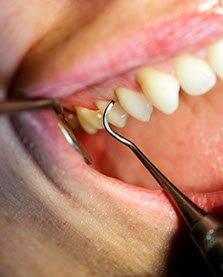 Dental Cleanings
Dental Cleanings
Dental cleanings usually involve scaling and polishing your teeth. Generally it is recommended every 6 months, but for some people it may be every 3-4 months. This is in an effort to combat gum disease.
What is gum disease?
Gum disease is a type of bacterial infection caused by the build-up of plaque, the sticky, colourless film that forms on teeth every day. Symptoms of gum disease may include: shiny, red, puffy or sore gums, a change in gum colour, gums that bleed every time you brush, or chronic bad breath. The good news is that gum disease is almost always preventable, or, if present, can often be arrested.
Gum disease affects both the gums and the bones supporting your teeth. It appears in two forms: gingivitis and periodontitis. The mild form of gum disease is called gingivitis, in which the gums become sore, red, bleeding or puffy. Gingivitis can be easily reversed by a visit to the dentist, in addition to the patient working harder at brushing and flossing.
Untreated gingivitis can escalate into what’s known as periodontitis. This type of gum disease can lead to the destruction of gum tissue and the bone supporting the teeth.
Smoking
 If you smoke, you may be causing trouble for your teeth and gums. Smoking kills cells inside your mouth. Smoking can make your mouth more susceptible to infections and is one of the leading causes of oral cancer. Smoking can also discolour teeth and fillings.
If you smoke, you may be causing trouble for your teeth and gums. Smoking kills cells inside your mouth. Smoking can make your mouth more susceptible to infections and is one of the leading causes of oral cancer. Smoking can also discolour teeth and fillings.
Diabetes
In some people, the drastic deterioration of periodontal (gum and bone) conditions found during a dental examination has led to the diagnosis of previously undetected diabetes.
Effective oral care routines can reduce inflammation in the tissues around the teeth and may help to improve the control of blood sugar for people with diabetes.
Research shows that diabetes and your oral health can affect each other.
This means if you have diabetes, you’re at greater risk for developing oral health problems such as gum disease and infections.
On the other hand, having gum disease can intensify the complications associated with diabetes by increasing your blood sugar levels.
Preventive Dentistry
Call our office today at 519-743-1172 or midgleydental@gmail.com to book an appointment!
©2016 Midgley Dental | Website Design By: Stylex Media Design Inc. | Sitemap

